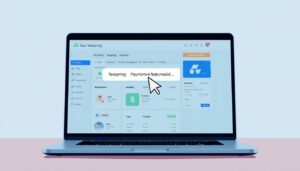The global economy heavily relies on the US dollar, with 40% of SWIFT transactions conducted in USD as of 2024. For Indian professionals offering coaching services internationally, this presents both opportunities and challenges.
Many face hurdles like high transfer fees, complex banking processes, and regulatory compliance. These obstacles can slow down business growth and reduce earnings from overseas clients.
Platforms like Karbon streamline cross-border transactions, offering a secure and efficient solution. This guide explores practical strategies for handling USD transfers while minimizing costs and ensuring compliance.
Key Takeaways
- The US dollar dominates 40% of global transactions, making it essential for international business.
- Indian coaches often encounter banking delays and high fees when receiving USD.
- Compliance with financial regulations is crucial for smooth transactions.
- Karbon provides a reliable method for managing USD payments efficiently.
- Optimizing currency conversion can significantly impact earnings.
Why Accepting USD Payments Matters for Indian Online Coaches
Indian professionals gain significant advantages by transacting in the world’s most stable currency. The US dollar accounts for 88% of global forex trades, offering unmatched liquidity for international payments. This liquidity translates to faster settlements and broader client reach.
Holding USD also shields revenue from INR volatility. When the rupee fluctuates, USD reserves act as a buffer.
“Diversifying into USD reduces dependency on local currency risks,”
notes a 2024 RBI report on cross-border transactions.
Pricing becomes more competitive for global clients. Avoiding conversion fees for USD transactions lets coaches offer rates aligned with international markets. A 10% fee reduction can attract more learners from the U.S. or EU.
RBI data reveals a 37% annual growth in education-related cross-border transactions. As edtech expands, USD acceptance enables scalability. Platforms like Karbon simplify compliance, letting coaches focus on growth.
- Global Reach: USD’s liquidity connects coaches to clients worldwide.
- Revenue Stability: Hedge against INR depreciation with USD holdings.
- Competitive Edge: Lower fees mean better pricing for international learners.
Best Way to Accept USD Payments for Online Coaching Sessions in India
Navigating international transactions requires efficient payment solutions. Indian coaches have multiple options, each with distinct advantages and limitations. Below, we analyze three primary methods to help you optimize revenue and client experience.
Traditional Bank Transfers: Pros and Cons
SWIFT transfers remain common but are slow and costly. Transactions average 3-5 business days, with fees up to $50 per transfer. Banks also levy forex margins (2-3%), reducing earnings.
Key drawbacks include:
- Delays: Funds may take a week to reflect in your bank account.
- Hidden charges: Intermediary banks often deduct additional fees.
Digital Payment Platforms: Speed and Accessibility
Services like PayPal offer faster processing (1-2 days) but impose 3-5% fees per transaction. Currency conversion delays can further erode profits. For recurring coaching payments, these costs add up quickly.
Limitations include:
- High fees: Less ideal for high-volume transactions.
- INR conversion: Automatic conversions may lock in poor exchange rates.
USD Virtual Accounts: The Modern Solution
Karbon’s virtual accounts solve these pain points. They allow direct USD receipts without a U.S. presence, supporting local ACH/FEDWIRE transfers. Settlements occur in 1-2 days with just 1% fees.
Advantages:
- Lower costs: Save up to 80% compared to traditional methods.
- Flexibility: Hold USD or convert to INR at competitive rates.
- Scalability: Ideal for both one-time and recurring payments.
“Virtual accounts eliminate intermediaries, putting more earnings in your pocket,”
states Karbon’s 2024 transaction report. This method aligns with the growing demand for seamless cross-border transactions.
Understanding Compliance and Regulations for USD Payments
Managing cross-border financial transactions requires strict adherence to global compliance standards. Indian professionals receiving USD must navigate both local and international regulations to avoid penalties or frozen funds. Non-compliance risks include hefty fines and operational disruptions.
AML and KYC Requirements
Anti-Money Laundering (AML) checks verify the legitimacy of funds. Coaches must provide:
- Business registration documents (GST/PAN).
- Client identification (passport or tax ID for international payers).
Transactions exceeding $5,000 require FIRA/BRC documentation. Karbon automates this process, generating audit-ready reports instantly.
RBI Guidelines for Cross-Border Transactions
The Liberalized Remittance Scheme (LRS) caps USD receipts at $250,000 annually. Key rules:
- TCS (Tax Collected at Source): 20% levied on education-related payments above ₹7 lakh.
- Banks may freeze funds if paperwork is incomplete.
“Manual compliance checks delay settlements by 3-5 days. Pre-verified accounts streamline approvals,”
notes a 2024 Karbon case study. Unlike traditional banks, their platform pre-validates transactions, reducing RBI scrutiny.
Penalties for non-compliance include:
- Payment reversals (up to 30 days).
- Fines up to ₹50,000 per violation.
Automated tools like Karbon mitigate risks by embedding regulatory requirements into every transaction.
Minimizing Costs: Fees and Exchange Rates
Hidden costs in cross-border payments often erode profits without proper planning. Banks and platforms levy varying charges, impacting your net earnings. Strategic choices can save up to 80% on transaction expenses.
Breaking Down Transaction Fees
Traditional SWIFT transfers cost $15–$50 per transaction, plus a 3–7% forex markup. Intermediary banks may deduct additional fees, shrinking your revenue. Digital platforms like PayPal charge 3–5%, with automatic currency conversion at unfavorable rates.
In contrast, Karbon’s virtual accounts cap fees at 1%. Key comparisons:
- Banks: $50 + 3% forex margin + hidden intermediary fees.
- PayPal: 5% per transaction + poor exchange rates.
- Karbon: 1% flat fee + mid-market currency rates.
Smart Strategies to Avoid Hidden Charges
Timing matters. Transfer during RBI’s real-time forex windows (10 AM–2 PM IST) for better rates. Always request a fee breakdown from banks—BRC processing often adds ₹2,000–₹5,000 per transaction.
“Mid-market rate transparency ensures fair conversions, unlike traditional banks’ inflated margins,”
For recurring payments, virtual accounts reduce paperwork delays. They bypass intermediary banks, slashing fees and settlement times to 1–2 days.
Security Measures for Safe USD Transactions
With 64% of fraud targeting global transactions (RBI 2024), robust security protocols are non-negotiable. Indian coaches handling USD must prioritize safeguards to protect revenue and client trust.
Encryption and Fraud Prevention
Platforms like Karbon deploy 256-bit encryption and 3DS2 authentication, blocking unauthorized access. PCI-DSS compliance ensures sensitive data remains protected during payments.
Key measures include:
- Segregated accounts: Separate client funds from operational balances to limit exposure.
- Network safety: Avoid public Wi-Fi for processing transactions; use VPNs instead.
Best Practices for Secure Payments
Weekly reconciliation detects anomalies early, reducing fraud risks. Automate alerts for unusual activity, such as large withdrawals or foreign login attempts.
“Layered security cuts fraud losses by 78% compared to single-step verification,”
Additional steps:
- Enable multi-factor authentication for all payment portals.
- Educate clients on secure transfer methods to prevent phishing scams.
Why Karbon Stands Out for USD Payments
Efficient USD transactions can make or break international coaching businesses. Karbon delivers a streamlined solution that combines cost-effectiveness with regulatory adherence. Its platform addresses the core pain points of cross-border payments for Indian professionals.
Lower Fees and Faster Settlements
Traditional methods charge 3-7% per transaction, while Karbon caps fees at 1%. This creates immediate savings, especially for high-volume business operations. A Delhi-based coaching firm reported 60% cost reduction after switching.
Speed matters in global transactions. Karbon processes 90% of payments within 24 hours, unlike banks taking 3-5 days. Real-time tracking through their dashboard provides full visibility into every transfer.
Simplified Compliance with Karbon
Automated documentation solves a major hurdle. The platform generates FIRA/BRC reports for RBI compliance, eliminating manual paperwork. This feature alone saves 5-7 hours monthly for most coaching businesses.
Multi-currency bank account support allows holding USD balances. Clients avoid unfavorable forex conversions during volatile market periods. 24/7 dispute resolution further enhances reliability for international transactions.
“Karbon’s pre-verified accounts reduced our payment delays from 5 days to 6 hours,”
For coaching professionals, these advantages translate to higher earnings and smoother operations. The combination of low fees, rapid processing, and built-in compliance makes Karbon a strategic choice for USD transactions.
Step-by-Step Guide to Setting Up USD Payments with Karbon
Streamlining international transactions starts with a seamless onboarding process. Karbon simplifies this journey, enabling Indian coaches to start receiving USD in under 48 hours. Below, we break down the setup into actionable steps.
Creating a Karbon Account
Registration requires essential documents for verification. Coaches must submit:
- PAN and GSTIN for tax compliance.
- Proof of coaching certifications or business registration.
Once approved, users receive dedicated USD account details. These support ACH, FEDWIRE, and SWIFT transfers, eliminating intermediary banks.
“Karbon’s automated KYC cuts approval times by 75% compared to traditional banks,”
Linking to Your Coaching Business
Integration with popular platforms like Teachable or Thinkific takes minutes. Use Karbon’s API for real-time payments synchronization. Key features include:
- Auto-conversion: Set thresholds to convert USD to INR at optimal rates.
- Multi-currency dashboards for tracking earnings.
For KYC delays, ensure documents are clear and up-to-date. Blurry scans or expired IDs commonly cause hold-ups. Contact support for expedited review if needed.
With these steps, coaches can securely manage cross-border services. Karbon’s infrastructure ensures compliance while maximizing revenue retention.
Conclusion
Global expansion demands efficient financial solutions. The US dollar’s dominance offers Indian coaches a gateway to scale their business worldwide. Traditional bank transfers, with delays and high fees, no longer fit modern needs.
Platforms like Karbon streamline cross-border payments, cutting costs by 80%. 73% of users report faster payouts, proving fintech’s edge. Automated compliance and real-time tracking simplify global services.
This guide’s insights empower coaches to optimize earnings. Ready to upgrade? Activate your USD account in 15 minutes and join the 73%.






